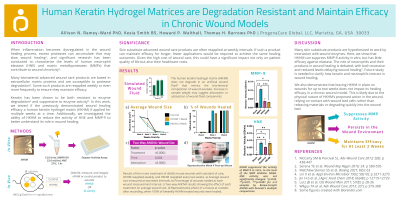Laboratory Research
(LR-040) Human Keratin Hydrogel Matrices* are Degradation Resistant in Simulated Chronic Wound Environments
Friday, April 28, 2023
7:15 PM - 8:30 PM East Coast USA Time

Thomas Barrows, PhD – Chief Scientific Advisor, ProgenaCare Global; Kesia Smith, BS – Research Associate, Research & Development, ProgenaCare Global; Howard Walthall, BSE, JD – CEO, ProgenaCare Global
Introduction: Non-healing wounds impose billions of dollars of healthcare costs worldwide and leave patients at risk for severe complications. Biomaterial wound care products have been developed to improve healing in these wounds. However, chronic wounds are widely reported to have elevated activity of proteases such as neutrophil elastase (NE) and matrix metalloproteinases (MMPs) compared to healing wounds[1,2], leaving protein-based products susceptible to degradation. Because keratin is resistant to many proteases[3], we investigated the durability of a human keratin hydrogel matrix (HKHM*) in chronic wound models in vitro and in vivo.
Methods: Circular wounds (6mm) were formed on the backs of db/db mice and treated with HKHM*, debridement, and dressing changes every other week for 8 weeks. Wound area was measured after debridement. Next, HKHM* was weighed before and after incubation both in saline and simulated chronic wound fluid (SCWF)[4] at 37 ºC for 1 week to investigate product hydrolysis. Finally, HKHM* was incubated with chronic wound concentrations of MMP9 and NE[5]. Product weight and supernatant enzyme activity were subsequently measured.
Results: When compared to three historical datasets of weekly HKHM* application on db/db mouse wounds, equal wound closure rates were seen with application every two weeks (p=0.2087), and both were accelerated compared to untreated wounds (p< 0.001) by two-way analysis of variance. HKHM* weight did not change over time in saline or SCWF (p=0.2502), and minimal change in product weight was seen with NE (5.7±3.3%) and MMP9 (-3.3±1.4%). Interestingly, HKHM* significantly inhibited MMP9 activity by over 90% (p< 0.0001), but NE activity was not significantly changed (p=0.8973) by analysis of covariance.
Discussion: Keratin has been reported to be both protease resistant[3] and inhibitory to MMPs[6]. We showed that a keratin-based wound care product* may be beneficial in the treatment of chronic wounds with elevated protease activity. These data suggest HKHM* persists in a chronic wound environment without degradation or loss of efficacy, which may be beneficial when weekly applications of advanced wound care products pose an economic or practical challenge. Additionally, the inhibition of MMP9 activity by HKHM* suggests a novel mechanism of action for keratin in chronic wound care.
Methods: Circular wounds (6mm) were formed on the backs of db/db mice and treated with HKHM*, debridement, and dressing changes every other week for 8 weeks. Wound area was measured after debridement. Next, HKHM* was weighed before and after incubation both in saline and simulated chronic wound fluid (SCWF)[4] at 37 ºC for 1 week to investigate product hydrolysis. Finally, HKHM* was incubated with chronic wound concentrations of MMP9 and NE[5]. Product weight and supernatant enzyme activity were subsequently measured.
Results: When compared to three historical datasets of weekly HKHM* application on db/db mouse wounds, equal wound closure rates were seen with application every two weeks (p=0.2087), and both were accelerated compared to untreated wounds (p< 0.001) by two-way analysis of variance. HKHM* weight did not change over time in saline or SCWF (p=0.2502), and minimal change in product weight was seen with NE (5.7±3.3%) and MMP9 (-3.3±1.4%). Interestingly, HKHM* significantly inhibited MMP9 activity by over 90% (p< 0.0001), but NE activity was not significantly changed (p=0.8973) by analysis of covariance.
Discussion: Keratin has been reported to be both protease resistant[3] and inhibitory to MMPs[6]. We showed that a keratin-based wound care product* may be beneficial in the treatment of chronic wounds with elevated protease activity. These data suggest HKHM* persists in a chronic wound environment without degradation or loss of efficacy, which may be beneficial when weekly applications of advanced wound care products pose an economic or practical challenge. Additionally, the inhibition of MMP9 activity by HKHM* suggests a novel mechanism of action for keratin in chronic wound care.

.png)